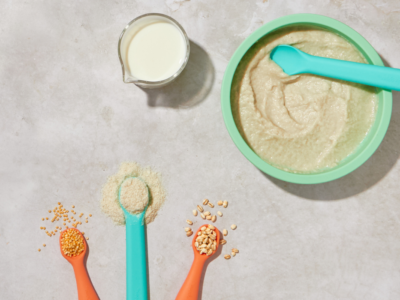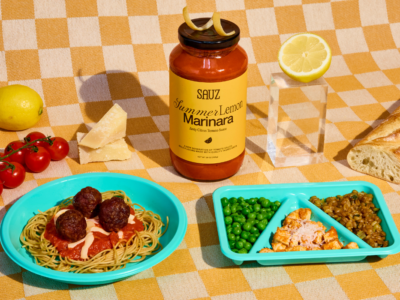Ah, toddlerhood. Just when you think the sleepless, never-ending days of the baby stage are over, your little one comes in full force with a whole new set of obstacles. Our least favorite? Picky eating. We’ve been there…trying anything in various stages of mealtime desperation—bribery, logic, time outs, dessert for dinner, sticker charts—to get our kiddo to eat a single veggie. But, when you seek out advice for how to deal with your picky little, you’re going to find a never-ending omnibus of opinions (hello, parenting).
We’re breaking down four commonly-held beliefs around toddler mealtime and why it’s just not always that simple.
Picky Eater = Bad Parenting
Allow me to clear the air right off the bat: just because your child is a picky eater, it does not mean you are a bad parent. Mom guilt is so ingrained within us that it is natural to feel like your child’s rejection of certain foods is a reflection of something you did. That doesn’t make it true, though. The other day, a mom I follow on Instagram posted a photo of her toddlers eating sushi. SUSHI. I legitimately stared at this photo for a couple minutes thinking about my daughter’s utter lack of willingness and interest to eat anything other than her staples of chicken nuggets, strawberries, cheese and waffles. I started down the rabbit hole of “what am I doing wrong?!” until I reminded myself that, hey, comparing yourself to Instagram posts is not reflective of real life and that as long as my child is healthy and happy, life is good.
Children are picky eaters for all sorts of reasons! The most common among them being that they want the ability to have control over their actions or they have a fear of the unknown. It is easy, as an adult, to be frustrated by this, but know that this is just a phase like so many other moments in raising these tiny humans and that there is no Golden Rule Book for Parenting (although it would be totally cool if there was, right?).
Hide the Vegetables
The myth that kids are anti-veggie just isn’t true. So many of us have heard the old joke—hide the vegetables in something else so they don’t even know they are getting them! We’ve all been there, done that when you will try anything to get your little one the nutrition they need but, we are big fans of veggie exposure! Introduce your babe to vegetables and fruits at an early age—even the less common ones! If it goes untouched on their plate that first time (or second, or tenth), that’s not a mealtime fail. Your little is still being exposed to that green and, one day, will even venture to take a bite! It’s all about repeat exposure here!
Look, I’m not knocking adding extra veggies to your kiddo’s staples to make sure they’re getting a nutritious meal. Little Spoon’s Chicken Super Nuggets Plate is the best of both worlds—cult-fave nuggets stuffed with hidden kale, carrots + cauliflower and your kiddo’s fave tots reinvented with sweet potato and carrot served alongside steamed broccoli. It’s important to expose your little one to the good stuff as often as you can. The more often they see them, the more likely they are to accept them as normal parts of their diet.
Despite having a daughter that is a picky eater, she loves avocados and broccoli, which are two foods you may not associate with a picky eater. Why does she ask for these? Because, at an early age, these were foods that she was exposed to over and over again in our kitchen, at mealtime, at the grocery store, and even in some of her books. Looking back, I wish I had been more proactive in this way with a wider variety of fruits and vegetables because that constant exposure has been proven to work time and time again.
Don’t Give Your Toddler Candy
If you’ve had a kid in your house for more than 30 minutes, then you know when you tell a child they can’t do or have something—that’s all they can focus on. Don’t touch that. Please don’t pick that up. Stop chasing the cat. You can’t have that right now.
These arguments frequently involve food, mainly “treats” such as candy, ice cream, sweets or other desired items. You’ll meet plenty of parents in the preschool pick-up line that will tell you that candy is a hard “no” in their household. But that doesn’t work for everyone, and it’s not always realistic. Kids are obsessed with what they can’t have and obsession is never healthy when it comes to food. Teaching your children moderation at a young age, versus restriction, will teach him or her to have a good relationship with food and helps take sweets off a pedestal. Experts agree—if you’re comfortable with your child eating dessert foods at a young age, regularly offering sweets in an age-appropriate portion and as just another food, instead of a reward, helps promote positive relationships with food.
Kids Should Clean Their Plate
I’ve heard this so many times and chances are you have, too. Heck, you’ve probably even heard this said to adults! For so long, “cleaning your plate” was the sign of some strange, meal-time obedience but, to be honest, this made up philosophy is completely bogus and a little unhealthy.
Don’t get me wrong—my least favorite thing about toddler mealtime is throwing the food away at the end of the meal. I hate food waste. It makes me cringe. That being said, in order to get children to eat a variety of foods, they need to be exposed to it. That exposure often means that the small portion of salmon sitting on their plate is going to be untouched the first few times you put it on there. That persistence is what it will take to go from “I’m not eating that,” to “I love salmon, mommy!” Not to mention, when your child eventually does try that new item, wouldn’t you rather their association with that food be one of experimentation and excitement for discovering something new instead of one of tears and being in trouble for not eating something?
At the end of the day, we all want our kids to grow up to have a healthy relationship with food and sometimes that simply means going against the grain of the advice we’ve heard passed down through the mommy groups and generational opinions and simply doing what’s right for our littles.



